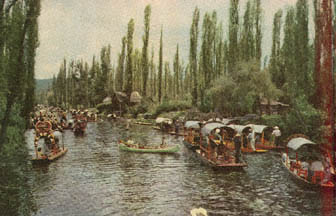|
XOCHIMILCO
When visiting Mexico City, there is an abundance of
day trips to choose from when planning your
activities. A fantastic destination to explore can be
found just outside the city. This is where the
historic canals of Xochimilco (so-chee-mil-co) are
located. In Nahuatl, the language of the Aztecs,
Xochimilco means "garden of flowers". Enjoyed by
foreigners and nationals alike, this magical location
dates back several centuries.
Miles of canals dot the landscape in Xochimilco,
enchanting the senses with their natural beauty.
Flat-bottomed boats called trajineras travel these
waters, as they have for hundreds of years. Produce
and flowers grow in abundance in this exotic
atmosphere. What makes Xochimilco so fascinating is
its embodiment of traditional Mexican culture. These
canals and gardens represent a living example of an
ingenious agricultural practice that was invented long
ago.
The Xochimilca people settled in the Valley of Mexico
between the eighth and tenth centuries. One of the key
challenges for these early inhabitants were the vast
amount of wetlands that the area possessed.
Traditional farming methods were not conducive in this
setting. To surmount the obstacles this water-filled
environment presented, the Xochimilca came up with a
creative solution.
 |
|
Postcard of Xochimilco from the 1950's | |
Using available resources, these settlers built
chinampas (floating gardens) on the surface waters of
Lake Xochimilco. Using cane structures, mud was placed
inside these containers and were anchored in position
by trees lining the shore. Fertilizer was culled from
the floor of the lake bed which was rich in aquatic
mulch. Flowers, fruits and vegetables grew abundantly
using this successful farming method.
The Xochimilca people who established these chinampas
were ultimately conquered by the Aztecs, who in turn
utilized these floating gardens to feed their growing
empire. During its height, the chinampa system
extended over 22,000 acres of wetlands and provided
food for tens of thousands of people. The canals were
built to navigate the chinampas and to provide a
transportation corridor which brought produce to the
Aztec Empire.
Today, the existing canals of Xochimilco represent
only a fraction of their former acreage. A portion of
the canals have been set aside, dedicated to an
ecological park, the Parque Natural Xochimilco. This
area of Mexico represents the only remaining habitat
for the Axolotl salamander, a critically endangered
species. Also, a great number of birds make their home
here, including herons, egrets and ducks, to name just
a few. In actuality, Xochimilco is home to over 150
native birds with approximately 70 species visiting
the canals during the winter season.
Visiting Xochimilco provides the traveler the
opportunity to view a part of Mexico's historic past.
On Saturdays a popular produce market attracts large
crowds. In the 1920's when the area was first starting
to attract tourists, Xochimilco was affectionately
called "the Venice of Mexico". In 1987 it was
designated a World Heritage site by UNESCO.
Spending time here is popular with both visitors and
residents alike. The brightly colored trajineras are
available to rent on a per hour basis. The canals of
Xochimilco provide a festival-like atmosphere with the
sound of mariachi bands filling the air. Smaller
canoes with vendors sell everything from
corn-on-the-cob to blankets to chilled beverages. This
travel destination is a wonderful spot to enjoy
recreation, fun and great scenery.
|